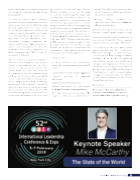ensure environmental, economic, and social well-being: the triple bottom line of true sustainability. To solve the world’s most intractable problems, our international schools and our students must not only be skilled at using the new applications and tools created by technological advances and have the computational thinking skills to understand and solve problems using complex data— they must also be empathetic, trans- disciplinary designers, engineers and creative collaborators. Again, how do our schools and communities do this? is is another area of deep exploration for those of us gathering in NYC for the 52nd conference in February. e rise of hate speech, public displays of intolerance and xenophobia, the apparent license to say whatever you like about anyone or any group, no matter how hurtful, warped or out of context it may be is a huge worry for our community here, and I am sure for all our schools around the world. I really worry that our young people are in danger of becoming increasingly desensitized to hate speech. I also worry where this may lead our young people and the society they will inherit from us. We have been having many conversations here in our own community about this—with our students, faculty, sta and families. We have decided to try to face this head on and not avoid having the tough and uncomfortable conversations. But this is a journey—inclusivity is not a destination in of itself, but, I personally believe, a way of being in the world. We are at the beginning of that journey here and I wanted to share a wonderful resource called “Facing History” with you all, if you do not already use it. Timothy McMahon, IB DP Econ., IBDP ToK, and MYP History Educator here at AIS sent me a wonderful digest of the key ideas that drive Facing History and how we can use this in our classrooms and communities. Tim’s missive included the following email from Facing History: “Dear Teacher, I am a survivor of a concentration camp. My eyes saw what no man should witness: Gas chambers built by learned engineers. Children poisoned by educated physicians. Infants killed by trained nurses. Women and babies shot and burned by high school and college graduates. So I am suspicious of education. My request is: Help your student become human. Your e orts must never produce learned monsters, skilled psychopaths, educated Eichmanns. Reading, writing, arithmetic are important only if they serve to make our children more human. Sent by a Principal to his teachers on the rst day of school.” www.facinghistory.org/ Tim’s actual article can be found later in this edition of InterED. is is another theme we shall be exploring in New York. I sincerely hope that you have already signed up for the 52nd Conference, February 5 through 7 in New York City, “Leaders United: Transforming Our World Together”, where we will be exploring some of these complex issues together with colleagues and organizations from around the world. Our opening General Session will be in the United Nations Building in New York City—it will be a powerful place to begin this dialogue, from the podium of the General Assembly of the United Nations. See you there. Kevin Glass Kevin Glass is President, AAIE Board of Trustees and Headmaster of Atlanta International School, [email protected] intered www.aaie.org 5
